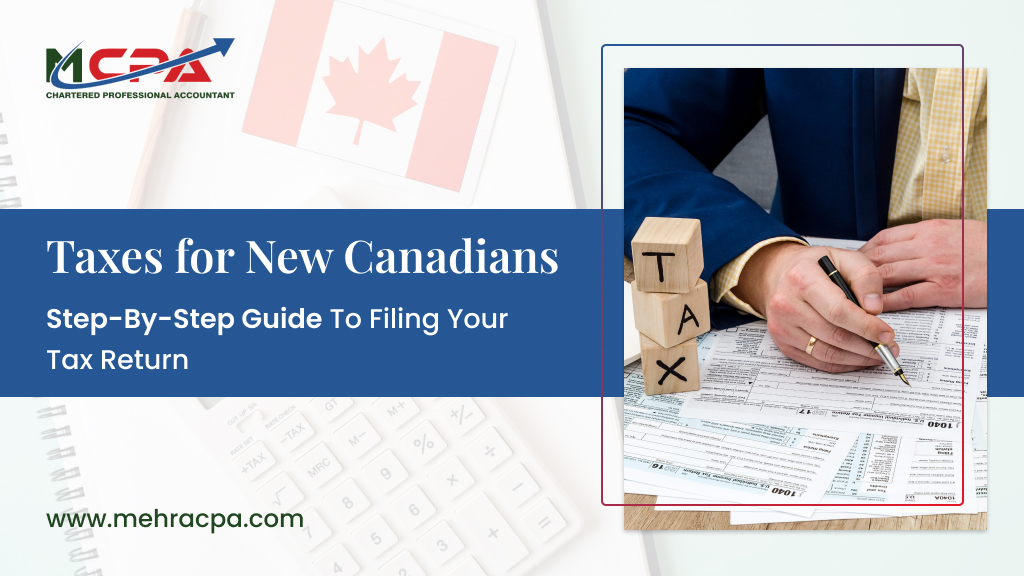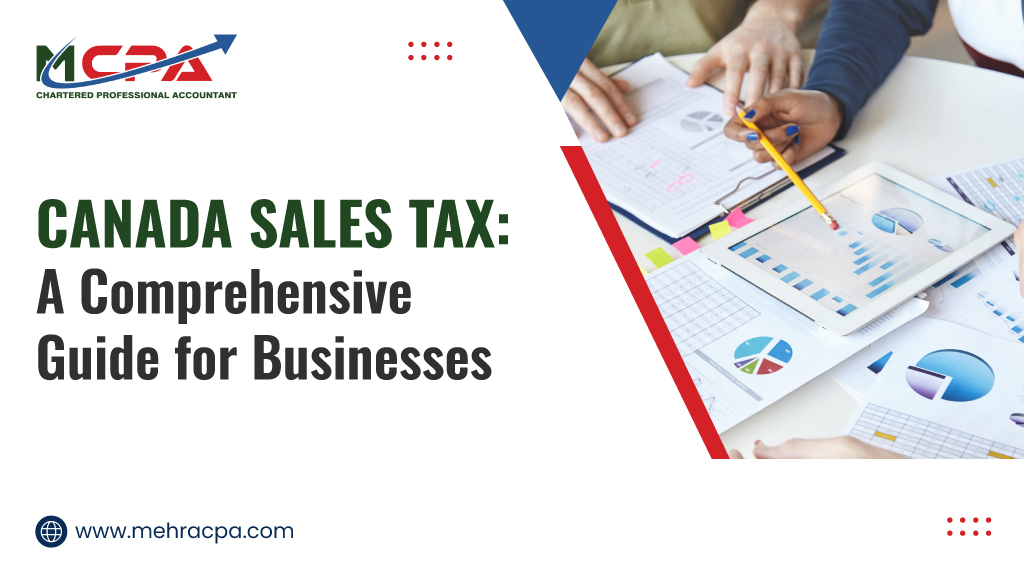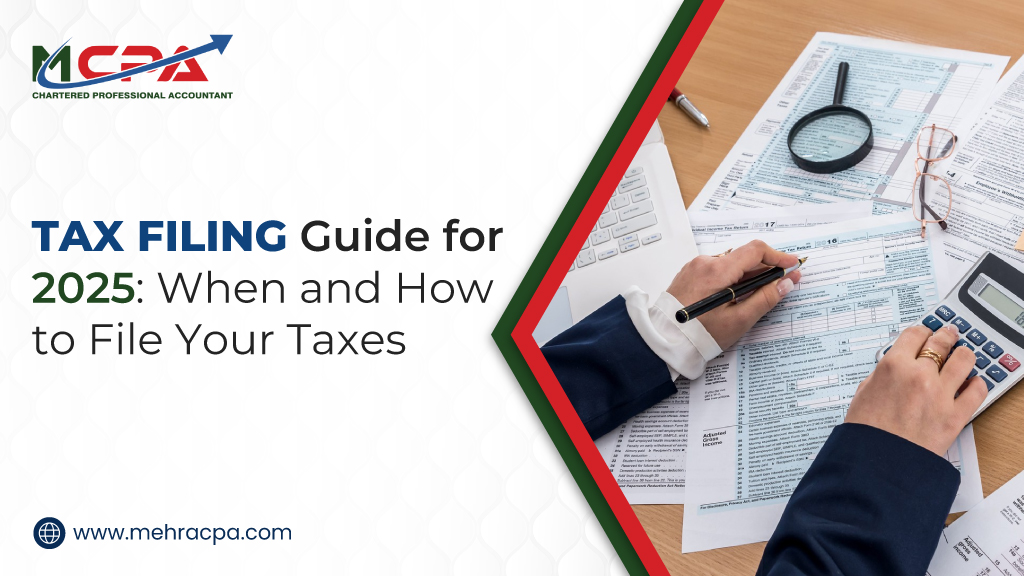
Recent Post
2025 Canadian Tax Deadlines: Everything You Need to Know
Every year, Canadians are required to file their taxes on…
Taxes for New Canadians: Step-by-Step Guide to Filing Your Tax Return
Moving to Canada is an exciting journey filled with new…
Canada Sales Tax: A Comprehensive Guide for Businesses
What is Sales Tax? If you own a business in…
Tax Filing Guide for 2025: When and How to File Your Taxes
Filing taxes can seem like a daunting task, but with…
Running a business comes with a variety of expenses, from paying employees to keeping the lights on. Fortunately, tax write-offs can help reduce your tax bill by deducting certain expenses from your taxable income. In this guide, we’ll explore the top tax deductions for businesses in 2024. Whether you’re a small business owner or part of a larger organization, understanding these deductions can help you keep more money in your pocket.
Rent and Office Space
Rent is a major expense for many businesses, but it’s also one of the most valuable tax deductions available. Here are two common types of rent deductions:
- Traditional Office Space: If your business rents an office, warehouse, or retail space, you can typically deduct the full cost of rent. This deduction includes not only the rent but also any maintenance fees, property taxes, or other costs passed on by the landlord.
- Home Office Deduction: If you run your business from home, you might be eligible for the home office deduction. The IRS allows you to deduct the portion of your home expenses (like utilities and rent) that directly relates to your business activities. For instance, if your office occupies 15% of your home’s square footage, you can deduct 15% of your monthly rent and utility bills.
Example: Imagine you run a small business out of a rented office space and pay $1,500 monthly in rent. Over the year, you could deduct $18,000. For home-based businesses, if your monthly rent is $1,200, and 15% of your home is your workspace, you can deduct $180 per month or $2,160 for the year.
Salaries and Wages
Employee salaries and wages are another substantial write-off for businesses. You can deduct employee wages, bonuses, commissions, and even some types of employee benefits.
- What’s Covered: Salaries, wages, bonuses, commissions, and employer-paid taxes (like Social Security and Medicare).
- What’s Not Covered: Payments to sole proprietors, partners, or LLC members. These payments are considered a share of the profit and are not deductible as a business expense.
Example: If you employ three people with combined salaries totaling $120,000 annually, you can deduct the entire amount. Additionally, you can deduct any employer-paid payroll taxes, which typically add about 7.65% of employee wages to your total deduction.
Contract Labor
Independent contractors and freelancers play essential roles in many businesses. Payments to these workers are deductible as long as they’re necessary for your business.
- Form 1099-NEC: You’ll need to issue a 1099-NEC form for contractors if you pay more than $600 annually.
- What’s Covered: Freelancers, consultants, and other contractors. This deduction includes payment for specific projects, ongoing services, and retainer fees.
Example: Suppose you hired a graphic designer for a rebranding project and paid $5,000. Since they’re a contractor, you can deduct the full amount paid as a business expense.
Business Insurance
Insurance protects your business from risks, and most types of business insurance are tax-deductible. The IRS considers these costs necessary for business, which makes them fully deductible.
- Types of Deductible Insurance: General liability, property insurance, and malpractice insurance. If you have employees, workers’ compensation insurance is also deductible.
- Health Insurance: For business owners who are self-employed, health insurance premiums may also be deductible if you meet specific requirements.
Example: If you pay $3,000 annually for general liability insurance and $1,000 for property insurance, you can deduct the full $4,000 from your taxable income.
Depreciation
Businesses often purchase large assets like vehicles, equipment, and furniture. Depreciation allows you to deduct a portion of the cost each year, spreading the expense over the asset’s useful life.
- Section 179 Deduction: Allows you to deduct the full purchase price of qualifying equipment and software up to a specific limit for the year you bought it.
- Bonus Depreciation: In addition to Section 179, you can also use bonus depreciation to accelerate deductions for certain assets. In 2024, businesses can still take advantage of this deduction for qualified assets.
Example: If your business bought a $20,000 machine, you might be able to deduct the entire amount under Section 179 in the year you purchased it. Alternatively, you could spread this deduction over several years through standard depreciation.
Utilities and Internet
Utility costs, including internet, phone, electricity, water, and heating, are deductible if they’re necessary for your business operations. These deductions are straightforward but can add up significantly over time.
- What’s Covered: Business-related utilities like phone lines, internet, water, and electricity.
- Home Office: If you work from home, you can only deduct the portion of your utility expenses that relate to your business activities.
Example: If you pay $300 per month for internet and phone services dedicated to your business, you can claim a $3,600 deduction at the end of the year.
Travel Expenses
Travel expenses are common for businesses, especially those that operate nationwide or internationally. These expenses are deductible as long as the travel is directly related to business activities.
- Deductible Travel Expenses: Airfare, hotels, rental cars, and 50% of meal costs. You can also deduct taxi fares and other transportation costs for business purposes.
- What’s Not Deductible: Travel expenses for family members who aren’t involved in the business and personal vacation days taken during a business trip.
Example: If you attend a conference in another state and spend $500 on airfare, $600 on a hotel, $300 on meals, and $200 on transportation, you can deduct $1,600. However, you’ll only be able to deduct 50% of the meal costs, so your total deduction would be $1,450.
Vehicle Expenses
If you use a vehicle for business, you can deduct costs based on the percentage of business use. You can calculate this deduction using the standard mileage rate or actual expenses.
- Standard Mileage Rate: For 2024, the IRS allows a deduction of 67 cents per mile for business driving.
- Actual Expenses: You can also deduct the actual costs of operating the vehicle, such as gas, maintenance, and repairs, based on the percentage of time the vehicle is used for business.
Example: Suppose you drive 10,000 miles in a year, with 7,000 of those miles being for business. Using the standard mileage rate, your deduction would be 7,000 miles x $0.67, totaling $4,690.
Marketing and Advertising
Marketing is crucial for growth, and the IRS allows businesses to deduct most advertising costs. Any activity directly tied to promoting your business is generally deductible.
- What’s Deductible: Social media ads, print materials, website expenses, and business cards. If you hold promotional events or sponsor local sports teams, those costs are also deductible.
- What’s Not Deductible: Gifts to clients and donations unless given to a qualified charitable organization.
Example: If you spend $2,000 on social media ads and $1,500 on a website overhaul, you can deduct the entire $3,500 as a marketing expense.
Professional Services
Hiring experts such as accountants, lawyers, and consultants can be a wise decision for your business. You can deduct any fees paid to these professionals if the services directly benefit your business.
- Types of Services: Accounting fees, legal fees, tax preparation, and consultation fees. Many small businesses hire outside help for bookkeeping, legal guidance, or HR.
- What’s Not Covered: Fees related to personal finances, family matters, or other non-business areas.
Example: If you pay $3,000 for tax preparation and legal consultations, you can deduct these expenses in full. This helps ease the financial impact of seeking professional guidance.
Recent Trends and Updates
As tax laws continue to evolve, it’s important to stay informed about the latest changes. Here are some noteworthy updates for 2024:
- Inflation Adjustments: The IRS adjusted standard deductions and tax brackets for 2024. For example, the standard deduction for married couples filing jointly is $29,200, while single filers receive $14,600.
- Increased Mileage Rate: With the mileage rate now at 67 cents per mile, businesses can expect slightly higher deductions for travel-related vehicle expenses.
Take Control of Your Business Finances
Understanding tax deductions can significantly impact your business’s financial health. By tracking your eligible deductions throughout the year, you can make smarter financial decisions and keep more money in your business. This not only improves your bottom line but also helps you reinvest in growth and development. Always consult with a tax professional to ensure you’re maximizing your deductions while staying compliant with tax laws. With these ten deductions in your toolkit, you’re well on your way to smarter tax savings and a stronger financial foundation.
Partner with Mehra CPA for Financial Clarity and Tax Savings
As you strive to optimize your business’s finances, having a trusted partner like Mehra CPA can make all the difference. With specialized expertise in tax planning and deduction strategies, We help businesses like yours navigate the complexities of tax law, ensuring that you take full advantage of available deductions. Our experienced team is dedicated to helping you minimize your tax liability, streamline your financial processes, and stay compliant with regulatory changes. Let us handle the intricacies of financial management so you can focus on growing your business with confidence, knowing that your financial health is in expert hands. Reach out to us today to learn how we can help you maximize your deductions and achieve long-term financial success.
FAQs
- What is a tax deduction?
A tax deduction is a way for businesses to lower their taxable income. When a business spends money on things like rent or salaries, they can subtract those costs from their total income. This helps them pay less in taxes.
- Why are tax deductions important for businesses?
Tax deductions are important because they help businesses save money. By deducting certain expenses, businesses can reduce their tax bills and keep more money for things like paying employees or buying supplies.
- Can I deduct my home office expenses?
Yes! If you run a business from home, you can deduct some of your home office expenses. This includes a portion of your rent, utilities, and other costs that relate to your workspace.
- What types of expenses can I write off?
You can write off many expenses, like rent, salaries, utilities, and travel costs. Even marketing and advertising costs can be deducted. However, personal expenses cannot be deducted.
- Should I talk to a tax professional?
Yes! Talking to a tax professional is a good idea. They can help you understand what you can deduct and make sure you follow the tax rules. This way, you can save money and avoid problems with taxes.




